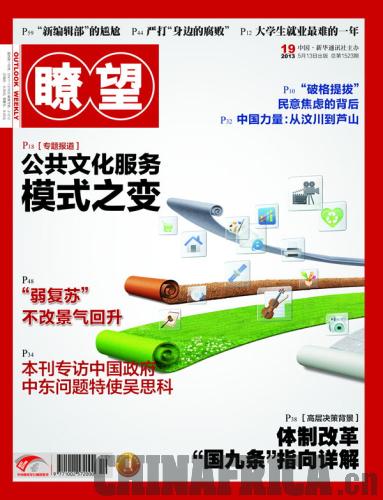| 
Facing a Dilemma
China Economic Weekly
April 28, 2013
Finding a job as a well-paid white-collar worker in an international company has been the shared dream of Chinese university graduates for years. The first generation of such people, now in their 40s or 50s, is currently facing another critical option in their careers, either to stay with foreign companies where their chances for promotion are slim, or to job-hop to a Chinese company or even start their own business.
China Economic Weekly looks at this dilemma. If one looks at a transnational company as a five-story building, the highest position a Chinese employee, no matter how excellent his or her performance is, can reach is one on the second floor. Such companies' senior officers are always foreigners. Some Chinese employees of foreign companies even face the risk of being laid off at any time. However, when choosing to hop to a domestic company, they may find it difficult to adapt to a different enterprise culture, and also suffer material losses as the salary and benefits offered by transnational companies are often superior.
But those who updated their knowledge reserves and gained experience, expertise and contacts that are vital to a company's development can neatly sidestep this dilemma.

Improving Public Cultural Services
Outlook Weekly
May 13, 2013
The 18th National Congress of the Communist Party of China, held in November of last year, announced the target of establishing a public cultural service system and making cultural industry a pillar of the national economy.
The Chinese Academy of Governance recently held a forum to discuss how to build such a system. Representatives from different sectors of the cultural industry in China reached a consensus that both the government and social organizations should be actively involved in the construction of the future cultural service system.
At present, China has built a public cultural service network covering both urban and rural areas. How to further improve the public cultural services was discussed by those present at the forum.
Currently, the functions of government, society and market are not well coordinated. The government has a stronger presence, but the market and society are weaker. Solving this problem is a major priority in the effort to strengthen public cultural services.
Safety Education Urgently Needed
Legal Daily
May 13, 2013
On May 11, five second-year students from a middle school in south China's Guangdong Province drowned in a river while barbecuing on its banks. When one accidentally fell into the river, the four other students linked hands in an attempt to rescue their friend, but subsequently fell into the water.
In recent years, there have been a number of such failed rescue attempts in China, with most incidents involving students.
This disaster reveals a gap in lifesaving education, with most school pupils unaware of the possible dangers involved and first aid procedures. For this reason, the public is calling for the enhancement of safety education at schools.
A major factor causing accidents is the poor conditions of public facilities. Society must move quickly to guard kids against accidents.

4G Is Coming
Caixin
May 6, 2013
Minister of Industry and Information Technology Miao Wei said the country might issue fourth generation (4G) mobile network licenses to domestic telecom operators by the end of 2013.
As the telecom industry faces hard times, developing 4G capability is believed to bring great benefits to telecom operators.
At present, among China's three telecom providers, only China Mobile offers 4G services. It has already set up 4G networks for trial use in 15 cities. The speed of 4G networks is much faster than that of 3G.
The other two operators, China Unicom and China Telecom, are not eager to develop 4G technology because they have reaped great benefits from using third generation (3G) networks. However, China Mobile has pinned all its hopes on 4G because of the unsatisfying performance of its TD-SCDMA on 3G networks. Experts observe that the issuance of the 4G licenses can help stimulate China's development, which has slowed down since 2012.
Large Shortage of Nurses
Workers' Daily
May 13, 2013
May 12 was International Nurses Day. While hospital workers are widely praised for their contribution to public health, staff shortages have become a major concern in hospitals across China.
According to the Beijing-based Chinese Nursing Association, the country needs at least 1 million nurses to meet current medical service demands.
Although nurses are urgently needed, many hospitals are unwilling to fill vacancies, in part because public hospitals are insufficiently funded.
Furthermore, the salaries and social status of nurses are far from satisfactory. Health workers often work overtime with few career prospects, which encourages many nurses to find other work and further worsens the shortage of experienced nurses.
The government should resolve the problem as soon as possible, by, for instance, improving incomes and establishing labor security systems. |